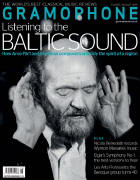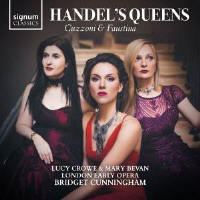Texte paru dans: / Appeared in: |
|
|
Outil de traduction (Très approximatif) |
|
|
Reviewer: Lindsay Kemp This is not the first time Francesca Cuzzoni and Faustina Bordoni, the star sopranos Handel engaged for his London operas in the 1720s, have ridden again: Emma Kirkby and Catherine Bott summoned them over 20 years ago (Hyperion, 11/97), invoking the title ‘The Rival Queens’ as a reminder that the 18th-century London press egged the public into believing in unseemly competition between the two. Bridget Cunningham plays down the rivalry bit, and the Handel connection too, drawing on arias by some of the other composers who wrote for these singers over a period of nearly 20 years. She has researched well – as her generously informative booklet notes reveal – and the result is no fewer than 15 premiere recordings. Even among the chosen Handel arias, only ‘Da tempeste’ from Giulio Cesare could be called well known. A worthy project, then, and indeed it is fascinating to have a less Handelcentric view than usual. For of course Bordoni and Cuzzoni had careers on the continent either side of their time in London, and thus we are able to drop in on the north Italian scene in music by Pollarolo, Porpora, Orlandini, Vivaldi, Leo and Vinci, as well as Munich and Dresden in the company of Torri and Hasse (who happened to be Bordoni’s husband). Some of these figures were representatives of the new Neapolitan style, edging towards the pre-Classical and emphasising a certain kind of vocal virtuosity, and it is interesting to hear Handel – perhaps inspired by his singers – moving a little bit that way in the trilling and tripleting of ‘Alla sua gabbia d’oro’. More importantly, this soundly made programme is both pleasing and intriguing: Vivaldi’s ‘Nelle mie selve natie’ leaves the voice bravely unaccompanied between ritornellos; Leo’s ‘Quel nome se ascolto’ makes muscular use of syncopation and chromatic slides; and Bononcini’s ‘Deh! lascia o core’ is truly touching. We can’t ever know what these two great singers actually sounded like, of course, but Lucy Crowe plays Cuzzoni as a bright soprano whose technical precision and agile upward-leaping ornaments combine with musicality to impress and move, while Mary Bevan offers a Bordoni with a lower centre of gravity, generally darker and more directly theatrical; if she is less comfortable than Crowe in passagework, she matches her for dramatic presence in a number such as Handel’s ‘Gelosia, spietata Aletto’. The orchestra, it must be said, do not always conform; though perfectly stylish, they can nevertheless be wiry and in need of a shot more electricity. For lovers of Baroque singing though, this recital should be a welcome guest. |
|




